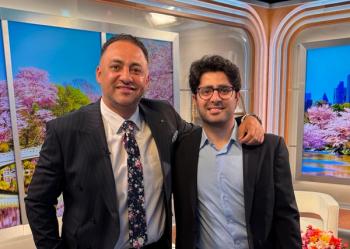
- Psychiatric Times Vol 28 No 12
- Volume 28
- Issue 12
Happy 70th Birthday, Dad
"What do you mean, a psychiatrist?” I asked my mom that question with great concern-and she explained to me exactly what my father did when he left the house each morning before I was even awake.
"What do you mean, a psychiatrist?” I asked my mom that question with great concern-and she explained to me exactly what my father did when he left the house each morning before I was even awake.
Until I asked that question one day when I was in fourth grade, the only thing I knew about my father’s job was that he was a doctor. That meant he wore a stethoscope and a white coat and he went around from patient to patient saving their lives. The fact that I had never actually seen my father wear a white coat or handle a stethoscope did not impinge on my fantasies . . . that is, until my mom explained the field of psychiatry in words that I could understand: “A psychiatrist talks to people and gives them medications to help them feel better when they are sad.”
To my 8-year-old mind, this was a paltry substitute for the role assigned to my father by my exuberant imagination.
Although I thought that the esteem in which I held my dad’s profession had reached a low point that day, I was wrong. A year later, I spent another baseball season in a distant outfield corner of the Tampa Bay Little League field. At season’s end, the team congregated for an end-of-the-year celebratory dinner. From my seat, I overheard the coach’s wife mention how awful her “shrink” was and how they were all “worthless.” I later asked my mother what the woman had meant by a “shrink,” because until that day my vocabulary only included this word as verb. I was in tears moments later when my mother filled me in: “A shrink is a word we don’t use for a psychiatrist.”
How, you might ask, did that somewhat disillusioned fourth grader wind up in his final year of psychiatric residency? It’s clear to me now that my relationship with my dad has served as a flashing arrow pointing me toward my career path. I focus on the relationship-not my father’s professional image-because unlike some of the other physicians my parents socialized with, I never saw someone walk up to my father and say, “Dr Forman, you saved my life.” In fact, it was not until I was in my twenties that a woman approached me and told me my father was her doctor and how much he had helped her.
One memory in particular captures the exemplary qualities of my father that now guide me in my practice. After completing eighth grade at a local school with only 7 classmates, I began high school in a class of close to 100 students. Although small by most standards, the new school seemed giant to me. I went from having close friends to knowing no one, and the students at my new school were less than eager to befriend the new guy. The adjustment was difficult, and my distress over this change was evident to my mom and dad.
During that year, when I felt so out of place at school and missed having close friends to rely on, my father fulfilled so much of this important role. On weekends, my dad forwent golf with adults and instead played with me, round after round. My father told me that I was his favorite golf partner, and I believed him. Many Saturday nights, my parents sacrificed a night to go out together or with other couples, and instead brought me to the movies or dinner with them. My father made all this time he was spending with me appear so normal. In retrospect, I can see that he helped me exactly in the way that I needed to be helped. When I finally did get a call from my classmate Emily wanting to know if I could go bowling on Sunday with her and her friends, my father simply smiled, signaling his consent. He did not hold me to our golf appointment that weekend. While I felt bad about letting down my golf partner, I realize now how happy he must have been to go to the range that day and hit balls alone.
The coach’s wife at the little league party may have been right that her “shrink” was awful, but she was certainly wrong when she said that all shrinks are worthless. It has been a long time since I let go of the image of my father rushing around the hospital saving people’s lives. That image has been replaced by the reality of a man so genuine and warm that he was able to bring true healing to his son and, undoubtedly, to countless of his “real” patients.
Happy 70th birthday, Dad.
Articles in this issue
about 14 years ago
In Memoriam: Daniel W. Shuman, JD: A Gift for Collaborationabout 14 years ago
Empty Words in Psychiatric Records: Where Has Clinical Narrative Gone?about 14 years ago
The Debate Over DSM-5: We Invite Your Viewsabout 14 years ago
Brother Dogabout 14 years ago
A Synapse Darkly: Psychiatry at a Critical Junctureabout 14 years ago
Sexual Minority Identity Developmentabout 14 years ago
Welcome to Our Editorial Board!about 14 years ago
Meditation on Manic-Depressive Illnessabout 14 years ago
Psychiatric Pharmacogenomics: Research DirectionsNewsletter
Receive trusted psychiatric news, expert analysis, and clinical insights — subscribe today to support your practice and your patients.







